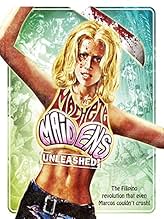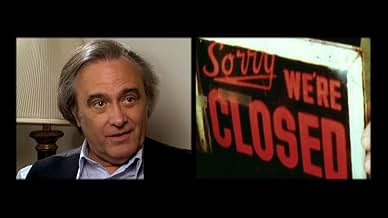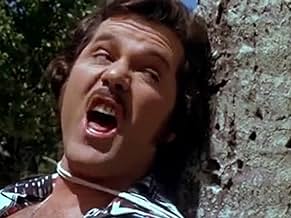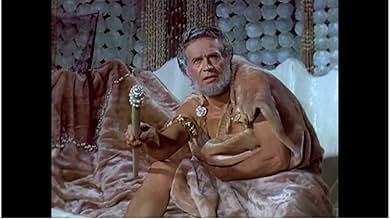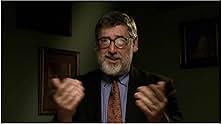IMDb रेटिंग
7.3/10
1.9 हज़ार
आपकी रेटिंग
अपनी भाषा में प्लॉट जोड़ेंA fast moving odyssey into the subterranean world of the rarely explored province of Filipino genre filmmaking.A fast moving odyssey into the subterranean world of the rarely explored province of Filipino genre filmmaking.A fast moving odyssey into the subterranean world of the rarely explored province of Filipino genre filmmaking.
Gerardo de Leon
- Self - Director
- (आर्काइव फ़ूटेज)
फ़ीचर्ड समीक्षाएं
Directed by Mark Hartley, the man behind Electric Boogaloo: The Wild, Untold Story of Cannon Films, comes Machete Maidens Unleashed. It's a fast moving but pretty informative look at exploitation films in the late 60's, 70's and early 80's. It's main focus is to give explanation about the wild films that came out from the Philippines. Many of the B movie staples came from this era of film. It spans about 15 years where these films were all the rage at Drive-Ins and the rules didn't apply.
The film starts off with showing how production moved from the states to the Philippines after it was liberated by America. The country was very American friendly. Gerry de Leon and Eddie Romero were the first filmmakers to establish themselves and start making films. The first focus was on the Blood Island films of which there were a few. It's funny to hear the filmmakers talk about these films while clips are show. The films were goofy horror movies shot on shoestring budgets with thin plots and bad acting. What brought people to these films were the shocks promised from the trailers. There would be gore, obviously fake gore but monsters, science fiction and terror.
Roger Corman is introduced as producer as his time line crosses with that of Eddie Romero. Corman was a bigger name and he had lofty aspirations. Most of the 'hit' films being produced by him. The montage of what he was known for is hilarious. There's also a montage of all of the elements in a good Corman movie. Having not seen many of his film, it was interesting that he wanted to make the 'best' film with the money he had.
But the films out of this area Corman is known for where highlighted in a feature on women in prison film. These films were actually highly successful because of the way they portrayed women as the heroes. Even though they were meant to titillate and entertain, the films helped the up and coming feminist movement. There are interviews with many of the famous actress such as Pam Grier, Colleen Camp, Judith Brown, Leigh Christian & Gloria Hendry. They were put through the ringer. The interviews are the most fascinating here. There are first hand accounts of what the actresses had to go through. Some of the things they went through will be shocking but not against the times.
Sig Haig gives insight on what he had to go through in these films as well. Being that all these films were R-rated or not rated at all, it was refreshing to see the clips in all their uncensored glory. I would hate to watch a PG-13 version of this film. It wouldn't give the films their shock credit. There are ample amounts of nudity and bloody violence. The highlight of all the interviews is many of the moments with John Landis. He provides uncensored thoughts which are insightful and laugh out loud funny. I could have seen all the uncut footage from his interviews. I know there was more great commentary from the director.
In the middle of the 70's the blaxploitation films were all the rage. Two of the films that led the charge came out Phillippines. Cirio H. Santiago directed TNT Jackson, which many of the actors talked about. It was a film that mixed Kung Fu with full on action and had a black female lead. This section of the documentary is most about the late 70s mixing of martial arts in the B-movie era. The stunt work is highlighted as most of the actors did all their own stunts. And the extra were on board for doing anything. Many were injured and a few died. But it was the idea of being in a 'big' Hollywood film that tested people's limits. A small portion of the film is devoted to Francis Ford Coppola whose Apocalypse Now is infamous for it's filming in Philippines. It's only give a few minutes in the documentary but enough is shown that made me want to dive into Heart of Darkness.
The final stretch of the film speaks about Manila International Film Festival and the growing film market. Jaws and Star Wars are targeted as B-movies that were made on a A-level. With these films the decline of the Philippine cinema began. The final big success was the James Bond type spoof starting homegrown Weng Weng. It was the last hit of this era of B-movie cinema. This documentary was so insightful and entertaining. I wasn't bored for a minute. Given that it is unrated also help. So much footage was shown that I was intrigued to see some of these films as a whole. To my surprise, Netflix does carry many of these films. I can see a B-movie marathon in my future.
The film starts off with showing how production moved from the states to the Philippines after it was liberated by America. The country was very American friendly. Gerry de Leon and Eddie Romero were the first filmmakers to establish themselves and start making films. The first focus was on the Blood Island films of which there were a few. It's funny to hear the filmmakers talk about these films while clips are show. The films were goofy horror movies shot on shoestring budgets with thin plots and bad acting. What brought people to these films were the shocks promised from the trailers. There would be gore, obviously fake gore but monsters, science fiction and terror.
Roger Corman is introduced as producer as his time line crosses with that of Eddie Romero. Corman was a bigger name and he had lofty aspirations. Most of the 'hit' films being produced by him. The montage of what he was known for is hilarious. There's also a montage of all of the elements in a good Corman movie. Having not seen many of his film, it was interesting that he wanted to make the 'best' film with the money he had.
But the films out of this area Corman is known for where highlighted in a feature on women in prison film. These films were actually highly successful because of the way they portrayed women as the heroes. Even though they were meant to titillate and entertain, the films helped the up and coming feminist movement. There are interviews with many of the famous actress such as Pam Grier, Colleen Camp, Judith Brown, Leigh Christian & Gloria Hendry. They were put through the ringer. The interviews are the most fascinating here. There are first hand accounts of what the actresses had to go through. Some of the things they went through will be shocking but not against the times.
Sig Haig gives insight on what he had to go through in these films as well. Being that all these films were R-rated or not rated at all, it was refreshing to see the clips in all their uncensored glory. I would hate to watch a PG-13 version of this film. It wouldn't give the films their shock credit. There are ample amounts of nudity and bloody violence. The highlight of all the interviews is many of the moments with John Landis. He provides uncensored thoughts which are insightful and laugh out loud funny. I could have seen all the uncut footage from his interviews. I know there was more great commentary from the director.
In the middle of the 70's the blaxploitation films were all the rage. Two of the films that led the charge came out Phillippines. Cirio H. Santiago directed TNT Jackson, which many of the actors talked about. It was a film that mixed Kung Fu with full on action and had a black female lead. This section of the documentary is most about the late 70s mixing of martial arts in the B-movie era. The stunt work is highlighted as most of the actors did all their own stunts. And the extra were on board for doing anything. Many were injured and a few died. But it was the idea of being in a 'big' Hollywood film that tested people's limits. A small portion of the film is devoted to Francis Ford Coppola whose Apocalypse Now is infamous for it's filming in Philippines. It's only give a few minutes in the documentary but enough is shown that made me want to dive into Heart of Darkness.
The final stretch of the film speaks about Manila International Film Festival and the growing film market. Jaws and Star Wars are targeted as B-movies that were made on a A-level. With these films the decline of the Philippine cinema began. The final big success was the James Bond type spoof starting homegrown Weng Weng. It was the last hit of this era of B-movie cinema. This documentary was so insightful and entertaining. I wasn't bored for a minute. Given that it is unrated also help. So much footage was shown that I was intrigued to see some of these films as a whole. To my surprise, Netflix does carry many of these films. I can see a B-movie marathon in my future.
Very well made, thoughtful with plenty of fun clips. Always great to hear from ever delightful insiders Jack Hill, Roger Corman, Joe Dante and Sid Haig. Not to mention the still very gorgeous Marlene Clark, Judy Brown and Celeste Yarnell! Woulda loved to see even more of the goddess Pam Grier. Nice to see Filipino artistes I only read about, like Eddie Romero and Garcia. Obviously, fans of this genre have great patience and sense of humor and the film appeals at both levels. It runs at such a fast clip; I almost wanted to slow it down to digest and savor it all.
The only downside is admittedly very subjective, that being the inclusion of John Landis. Regardless of the outcome the trial re: the Twilight Zone film: JUST GO AWAY!! It's Stomach Churning to see him laughing on camera in Any interview. WHAT?! Landis gushes on the fun of " Irresponsible Filmmakers" and actresses showing T&A....Eeeewwww. Sure, he made some great films. However, plenty of people are just as enthusiastic and knowledgeable on B-movies. Mr. Holcomb and DeoCampo contributed erudite commentary and historical perspective. Does this dude not realize that 3 FAMILIES are still affected by the Very Preventable deaths that occurred under his watch?!?. Without Landis' presence, this film is Aces!
The only downside is admittedly very subjective, that being the inclusion of John Landis. Regardless of the outcome the trial re: the Twilight Zone film: JUST GO AWAY!! It's Stomach Churning to see him laughing on camera in Any interview. WHAT?! Landis gushes on the fun of " Irresponsible Filmmakers" and actresses showing T&A....Eeeewwww. Sure, he made some great films. However, plenty of people are just as enthusiastic and knowledgeable on B-movies. Mr. Holcomb and DeoCampo contributed erudite commentary and historical perspective. Does this dude not realize that 3 FAMILIES are still affected by the Very Preventable deaths that occurred under his watch?!?. Without Landis' presence, this film is Aces!
This is a very entertaining look at a specific time and place in the history of exploitation film-making. It documents the rather strange scenario where the Philippines became a hotbed of psychotronic cinema production between the 60's and early 80's. While I haven't seen more than two or three films that were made under these conditions, it didn't stop the film from being interesting and entertaining. In fact, like many similar documentaries Machete Maidens Unleashed! is most probably a lot more enjoyable than the films it features. Instead we get many, many clips from these crazy films, so it's difficult to get bored.
The films themselves range from the schlock horror of the 60's, via the women-in-prison flicks of the 70's to the martial arts action films of the 80's. It takes the form of the talking heads format where many of the participants tell us about their experiences working in the field. And perhaps unsurprisingly very different rules applied in the Philippines. There's a lot of humour in the presentation. No one is under any illusions about the seriousness of the movies, yet you will no doubt come away from this and have two or three new films you want to seek out. And I suppose with all that in mind, Machete Maidens Unleashed! has done its job.
The films themselves range from the schlock horror of the 60's, via the women-in-prison flicks of the 70's to the martial arts action films of the 80's. It takes the form of the talking heads format where many of the participants tell us about their experiences working in the field. And perhaps unsurprisingly very different rules applied in the Philippines. There's a lot of humour in the presentation. No one is under any illusions about the seriousness of the movies, yet you will no doubt come away from this and have two or three new films you want to seek out. And I suppose with all that in mind, Machete Maidens Unleashed! has done its job.
A fast moving odyssey into the subterranean world of the rarely explored province of Filipino genre filmmaking.
I love horror films and exploitation films and consider myself both a critic and historian (having now reviewed over 2000 films and written numerous articles). Yet, I must confess, I was not aware of the hundreds -- perhaps thousands -- of films that were made in the Philippines. I knew about some of them, of course, but did not know just how huge the output was.
Wow! This is one of the best documentaries I have ever seen on exploitation films (and I have seen my share). John Landis never disappoints, and some unusual suspects show up, too. R. Lee Ermey? Who knew?
I love horror films and exploitation films and consider myself both a critic and historian (having now reviewed over 2000 films and written numerous articles). Yet, I must confess, I was not aware of the hundreds -- perhaps thousands -- of films that were made in the Philippines. I knew about some of them, of course, but did not know just how huge the output was.
Wow! This is one of the best documentaries I have ever seen on exploitation films (and I have seen my share). John Landis never disappoints, and some unusual suspects show up, too. R. Lee Ermey? Who knew?
This was a an absolutely brilliant documentary on the history of film making back in the 70s and 80s in the Philippines.
Why the Philippines? Because it was cheap....very cheap and pretty much no rules with what you could do.
Most of the movies made then were b grade or grindhouse made for the drive ins. Though one big budget classic was made there ..... Apocalypse Now.
This documentary was made by the same people who made Not Quite Hollywood and Electric Boogaloo -The Wild, Untold Story Of Canno Films...both of witch are brilliant documentaries as well.
Great insights from Roger Corman, Pam Grier, John Landis, Joe Dante, R. Lee Emery Sid Haig, Chris Mitchum etc.
If you love 70s, 80s B movies this documentary is a must see!!!
Why the Philippines? Because it was cheap....very cheap and pretty much no rules with what you could do.
Most of the movies made then were b grade or grindhouse made for the drive ins. Though one big budget classic was made there ..... Apocalypse Now.
This documentary was made by the same people who made Not Quite Hollywood and Electric Boogaloo -The Wild, Untold Story Of Canno Films...both of witch are brilliant documentaries as well.
Great insights from Roger Corman, Pam Grier, John Landis, Joe Dante, R. Lee Emery Sid Haig, Chris Mitchum etc.
If you love 70s, 80s B movies this documentary is a must see!!!
क्या आपको पता है
- ट्रिवियाAll the footage of Quentin Tarantino interviewing Cirio H. Santiago had to be cut from the final finished version of the film.
- कनेक्शनFeatured in Kain's Quest: The Arena (2017)
- साउंडट्रैकLet's Go Where the Action Is
Written and Performed by Tommy Boyce and Bobby Hart
टॉप पसंद
रेटिंग देने के लिए साइन-इन करें और वैयक्तिकृत सुझावों के लिए वॉचलिस्ट करें
- How long is Machete Maidens Unleashed!?Alexa द्वारा संचालित
विवरण
- रिलीज़ की तारीख़
- कंट्री ऑफ़ ओरिजिन
- आधिकारिक साइटें
- भाषा
- इस रूप में भी जाना जाता है
- Девки с мачете на свободе!
- फ़िल्माने की जगहें
- उत्पादन कंपनियां
- IMDbPro पर और कंपनी क्रेडिट देखें
- चलने की अवधि
- 1 घं 24 मि(84 min)
- रंग
- पक्ष अनुपात
- 1.78 : 1
इस पेज में योगदान दें
किसी बदलाव का सुझाव दें या अनुपलब्ध कॉन्टेंट जोड़ें


